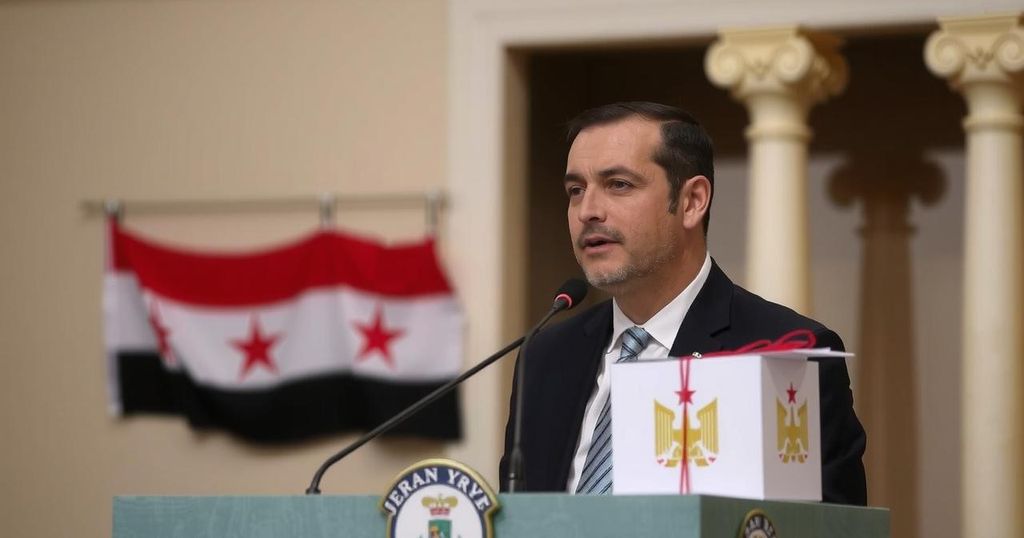Syria’s de facto leader Ahmed al-Sharaa stated that the country’s transition to democracy could take up to four years, requiring a rewrite of the constitution. In an interview, he discussed maintaining ties with Iran and Russia and expressed hope for U.S. sanctions to be lifted following Assad’s removal. An interim government is in place until March 1, aiming for UN-supervised elections after a transitional phase.
In a recent interview, Syria’s de facto leader, Ahmed al-Sharaa, indicated that the nation’s transition to a democratic system could span up to four years. He emphasized the necessity of drafting a new constitution, a process he estimates will require two to three years prior to the conduct of elections. Al-Sharaa’s remarks come on the heels of his Islamist group, Hayat Tahrir al-Sham (HTS), having ousted the long-time ruler Bashar al-Assad amidst a rapid offensive. Furthermore, Sharaa underscored the significance of maintaining strong relations with both Iran and Russia while also expressing hopes that the new U.S. administration might reconsider sanctions imposed on Syria under Assad’s regime.
During the interview, Sharaa articulated a vision for a political roadmap consistent with the United Nations Security Council Resolution 2254, which delineates steps for a peaceful transition in Syria. He is optimistic about achieving a new constitution and free elections following a transitional phase, as outlined by UN special envoy Geir Pedersen. An interim government is currently steering the country until March 1, aiming to guide the nation towards stability and democratic reforms.
Sharaa acknowledged the historical ties with Iran, asserting the need for mutual respect and non-interference, while also valuing Russia’s strategic interests in the region. He insisted that all armed groups should be integrated into a singular national army, specifically mentioning the necessity of negotiations with the Kurdish-led Syrian Democratic Forces (SDF). Sharaa praised the potential role of regional powers such as Saudi Arabia in Syria’s economic revival, suggesting that investment opportunities abound for neighboring countries.
The situation in Syria remains complex, as HTS seeks to transition from its past as a militant group into a more politically inclusive role. As the nation navigates through its political evolution, Sharaa’s leadership and the international community’s engagement will be critical in determining the trajectory of Syria’s future governance and stability.
The context surrounding the Syrian political landscape is defined by years of conflict and humanitarian crisis. Following the 2011 uprising against Assad’s regime, the situation escalated into a multilateral civil war involving various domestic and foreign actors. In 2015, the United Nations Security Council Resolution 2254 was adopted to outline a political framework for Syria’s future, emphasizing the importance of drafting a new constitution and conducting supervised elections. With the recent ousting of President Assad by HTS and allied rebels, the path to a peaceful transition lies in the resolutions to governance, territorial control, and regional alliances, particularly with Iran and Russia, which have been pivotal during the conflict.
In conclusion, Ahmed al-Sharaa’s assertion that Syria’s electoral process may extend up to four years reveals the complexities involved in the political transition of the war-torn nation. The reconstruction of a new constitutional framework, the importance of international alliances, and the integration of armed groups into a cohesive national defense force are crucial components of this journey. As regional powers look to invest in Syria’s future, the opportunities and challenges ahead will significantly shape the’s nation’s path toward stability and self-determination.
Original Source: www.abc.net.au






